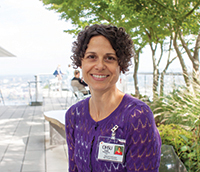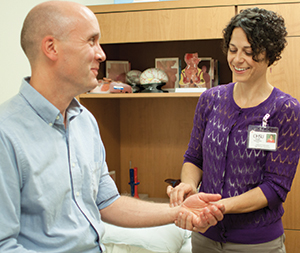Cancer and acupuncture? It has long made sense in the natural and alternative medicine community, but the notion in traditional allopathic medicine is relatively new.
Enter Dr. Angie Rademacher, a 2009 graduate of NCNM’s naturopathic doctoral program and its master’s in Oriental medicine program. Dr. Rademacher recently became the first acupuncturist to practice in the Oregon Health & Science University (OHSU) Knight Cancer Institute.
She is one of a growing number of natural medicine practitioners being welcomed as part of an integrative team in hospitals and clinics around the country. It doesn’t hurt that she also holds a nursing degree and for the past 10 years has been an oncology nurse at the Knight Institute.
“It was just a matter of expanding,” said Dr. Rademacher, “integrative medicine is a growing trend and patients want it.” Also, the Knight Institute had already embraced yoga, massage, writing and mindful stress reduction techniques to help cancer patients deal with the effects of chemotherapy. The institute, she said, has adopted the stance that any additional support they can offer patients is welcome.
Also, Dr. Rademacher knows all the healthcare professionals and staff at Knight, and because she brings both an allopathic and naturopathic perspective to the work, she speaks the same language. “I love the Western side,” she said, “it’s not the be all and end all,” but one instrument in a toolbox made bigger and more effective in conjunction with natural medicine.
She got word in 2013 that her proposal to introduce acupuncture to the institute was a go. She now assists at the hematology/oncology section of the institute half time, the other half of her schedule is taken up with a private practice at Tabor View Health & Wellness in Portland and chasing young twins around along with her husband.
Acupuncture, she said, has shown to help with neuropathy, the numbness and tingling sensation often experienced by cancer patients undergoing treatments. “Acupuncture can improve the blood flow supporting nerve health for neuropathy, and in general patients feel better,” she said.
OHSU also offers acupuncture treatments to cancer patients experiencing a range of other side effects including anxiety, depression, gastrointestinal issues and fatigue, to name a few.
 “It (medicine) always seemed to suit me,” said Dr. Rademacher, “I have always been attracted to the helping professions.” She especially likes that the profession combines her strong interest in science with the opportunity to work one-on-one with patients. “I like that connection with people.”
“It (medicine) always seemed to suit me,” said Dr. Rademacher, “I have always been attracted to the helping professions.” She especially likes that the profession combines her strong interest in science with the opportunity to work one-on-one with patients. “I like that connection with people.”
Early in her career she worked with kids who had cerebral palsy and other patients with disabilities. After completing her nursing degree at the College of Saint Benedict in Minnesota, she worked a year as a nurse and then joined the Peace Corps. She was sent to Malawi, Africa, where she worked as a healthcare volunteer assisting women and children with disease prevention.
It was in nursing school at Saint Benedict that she worked with an oncology professor who advocated integrated therapies that included green tea and guided imagery. That really piqued her interest, and she enrolled in NCNM’s ND program in 2003, adding the Chinese medicine component in her third year.
Now, as integrative medicine gains traction and cancer centers place more emphasis on comfort and palliative care, acupuncture may be used more for other side-effects management. She also sees opportunities for new biological and immune therapies, which could be aimed at specific cancers.
Oncology, she said, “often involves multiple systems in the body, which I find very interesting. The world of oncology is always changing with new and innovative therapies being offered.”
She is quick to add, though, that oncology has “a huge emotional component,” and that she enjoys working with patients and families to make their ordeal a little less onerous.
